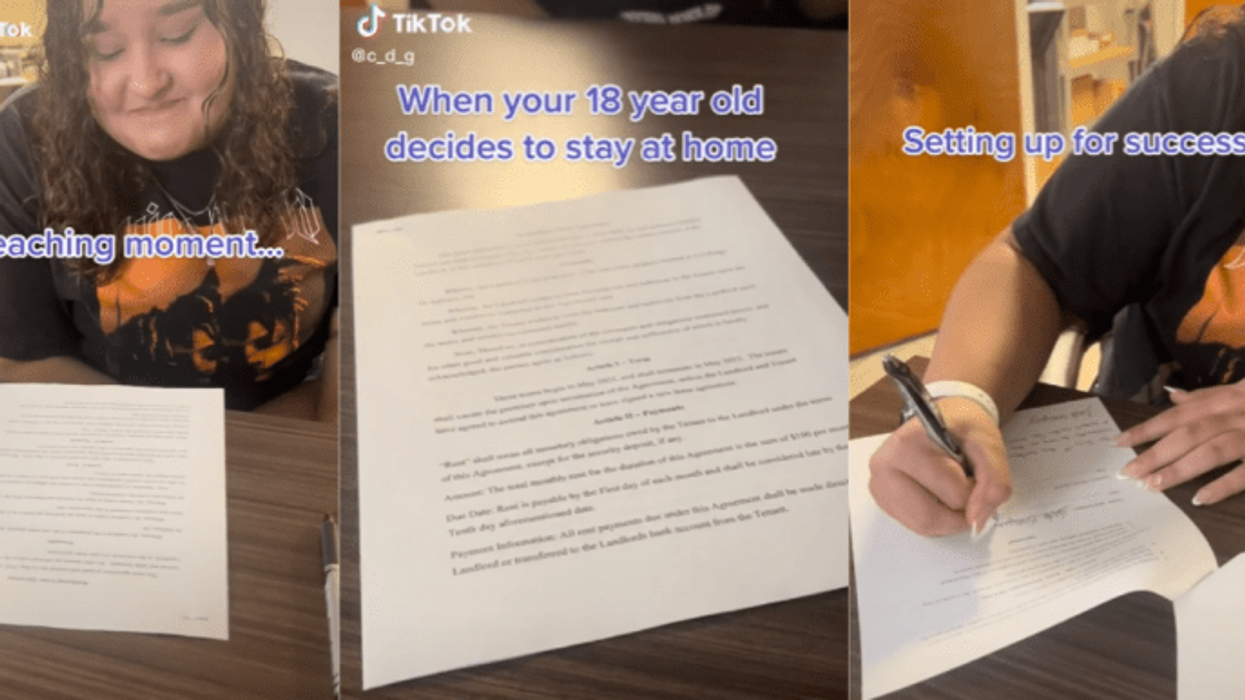Finding common ground with your children can be a challenge. Between wanting what’s best for them and helping them understand the responsibilities they will need when they are adults can be an arduous task. This could be even more difficult for a single parent.
A mother, who goes by the username @c_d_g on TikTok has stirred up a debate on parenting after she revealed that she required her 18-year-old daughter to sign a lease for her to continue living at home, reported the Independent.
The mother had posted a video that showed her daughter signing the lease. The video was captioned “It’s Life” according to a report by YourTango. The song “It's the Hard Knock Life" is reported to have been playing in the background and the video captions read as “When your 18-year-old decides to stay at home."
The video which shows the woman’s daughter looking over the document before signing her name has been viewed more than 1.6m times.
According to the lease, the daughter is required to pay $100 a month towards the rent of her childhood room. The document states that payment is required on the first of each month and “shall be considered late by the 10th day.”
According to parenting experts, all parents want their children to grow up and have confidence and self-worth. Parents need to help them learn and figure out who they are.
However, this mother’s parenting tactic has been criticized and has sparked a debate among viewers.
One person is reported to have commented, “I’m glad my parents love me.” While another wrote, “I’m so glad my parents provide a safe space for me unconditionally, I know I always have a place at home regardless of finances.”
On the other hand, some viewers have expressed that the parenting tactic is more understandable if the teenager’s mother intends to save the rent money acquired from her daughter for her future or when she moves out, for a smooth transition.
One viewer stated, “I think this is valid if you put the money away in savings for your kid to use for an actual down payment on something or for college, otherwise…idk.”
Another viewer repeated the same saying, “Take rent from her but save it all up and give it back to her once she moves out or gets married.”
The comments ranged from supporting the mother's decision to questioning her move.
Some users commented saying that she loves her daughter and that is why she is only charging her $100 for rent compared to paying two to three thousand for a single-bedroom apartment.
Others who don’t agree are reported to have replied saying that this is the girl’s home, a place where she should feel safe and always return to find unconditional love.
The mother who shared the video is quoted as saying "Actually our other daughter who is almost 19 has her own place, works, and goes to college.
My parenting and support also doesn't stop at 18…and my love isn't conditional. Setting my kids up to be successful when they move out is the point."
She went on to explain that her own parents did not “set [her] up for success,” and she had to “fight for every single thing” on her own when she became a single mother at 16.
“And I don’t want my children to have to do that. So, everything I do prepares them for the real world.” She added that she wants her children to learn to become independent and not depend on her for “anything.”
The TikToker claims that the lease agreement will help her daughter acquire a renter history which she believes will help her when she wants a place of her own. Another reason for the lease, she explained, is that it will help her 18-year-old to get the experience of reading a “legal document.”
Experts are of the opinion that it’s wonderful to be reasonable with your teen. It shows them a way of thinking, how to solve problems, and handle conflict – it could have lasting effects on how they approach adult life.
All the same, this particular parenting tactic displayed by the teen’s mother has not gone down too well with most people and some feel like it is an unorthodox and unfair way to treat your children.




